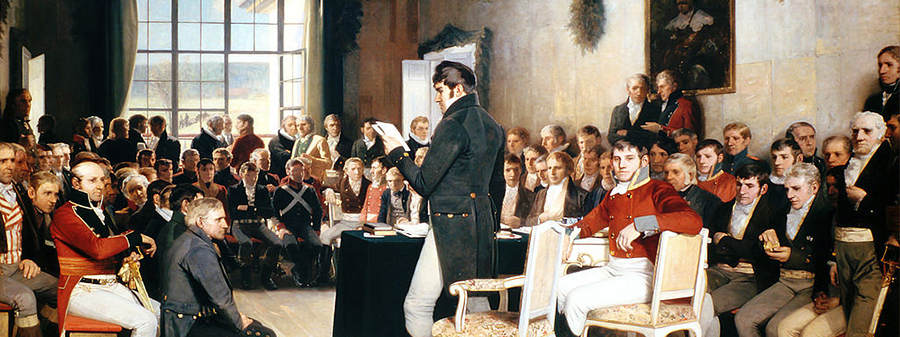Research - History - Department of Historical Studies
History

Much of the department's historical research covers Norwegian and international history after World War II. Within older history emphasis is on the Norwegian/Norse and other Nordic/North European Middle Ages.
Projects
These are projects and researchers in the discipline:
The goal of the project is to offer a collected and comprehensible presentation of the history of the Norwegian research councils. Project manager Thomas Brandt
 The Hidden Companies of the Global Economy: the development of international commodity traders 1945-2015 is an innovative research project breaking new ground in the research on global commodity trading. The project is funded by Fellesløftet, Norwegian Research Council and the Norwegian universities' joint funding initiative for Young Research Talents.
The Hidden Companies of the Global Economy: the development of international commodity traders 1945-2015 is an innovative research project breaking new ground in the research on global commodity trading. The project is funded by Fellesløftet, Norwegian Research Council and the Norwegian universities' joint funding initiative for Young Research Talents. The History and Strategic Raw Materials Initiative is an international network established in 2012 to facilitate historical research into questions relating to the political economy of natural resources. HSRMI was founded in 2012 by Andrew Perchard, Espen Storli and Mats Ingulstad in order to promote research into the political economy of strategic raw materials. Activities: workshops, conferences and collaboration on funding bids, including the Fate of Nations Project.
The History and Strategic Raw Materials Initiative is an international network established in 2012 to facilitate historical research into questions relating to the political economy of natural resources. HSRMI was founded in 2012 by Andrew Perchard, Espen Storli and Mats Ingulstad in order to promote research into the political economy of strategic raw materials. Activities: workshops, conferences and collaboration on funding bids, including the Fate of Nations Project.The Fate of Nations (FATNAT): Natural Resources and historical development in the Global Economy (1870-2020). The importance of control over natural resources for economic development, military power and political success has long been recognized in the literatures on international relations, political economy and development studies. Nevertheless, the existing literature does not give a clear understanding of the historical role of natural resources in determining the development of modern society in the era of value chains for raw materials spanning the globe.
The objective of The Fate of Nations (FATNAT) project is to examine a set of historical cases in which "transnational commodity spaces" have emerged and been managed by public and private interests, creating growth differentials across the world. Our hypothesis is that certain nations have entrenched themselves on the commanding heights of the global economy principally by virtue of their ability to combine and control internal and externally sourced raw materials. We will pursue this objective by applying a theoretical framework for investigating how commodity flows are transformed into growth and development, by using qualitative and quantitative data to compare different commodity sectors and countries over a 150-year period, and by tracing the interlocking constellations of companies, states and international institutions. The project is funded by the Norwegian Research Council (NRC) and the Norwegian University of Science and Technology (NTNU). Project duration: 1 December 2016 to 30 November 2021. Webpage for the project. Project manager Hans Otto Frøland.
The quest for natural resources has become increasingly global. In 2010, the World Bank identified 53 countries as highly resource dependent, some of them rich, others devastatingly poor. In a historical perspective, resource dependency has affected most of the world’s countries.
This project aims to widen the scope of existing research that focuses primarily on recent experiences in less developed countries and the shortcomings and failures of their regulatory systems, and study the shape and priorities of regulatory regimes in both developed and less developed countries over a 120-year time span. By examining a number of carefully selected case studies this project explores how successful regulatory systems have developed and how the conditions for success and failure have changed over time. Our hypothesis is that the global picture is more nuanced and multifaceted than current scholarship suggests. Historical analysis of the evolution of successful, partially successful and unsuccessful regulatory regimes will provide new insights into the dynamics and the outcomes of resource regulation.
The project will elucidate how underdevelopment traps were avoided, as well as how successful regimes were established and then maintained over long periods. The Norwegian Research Council (NRC) funds the project and the duration is 2016-2020. Project manager Pål Thonstad Sandvik.
NexusNidaros - Transitions and Traditions. Ecclesia Nidrosiensis and the Transformation of the Northern World is an international, multidisciplinary research group originating in the local research community, involving scholars with a special interest in Nidaros archbishopric and church province. The initiative is a long-term commitment designed to reach our chief objective: to acquire a better understanding of the transitions and traditions infusing the relationship between church and society from the Viking Age Christianization to the present day use of religious aspects from the Middle Ages ca 1000-1660. Participants: Randi Wærdahl, Erik Opsahl, Magne Njåstad, Susann Anett Pedersen, David Bregaint, Jan Frode Hatlen, Roman Hankeln, Leif Inge Ree Petersen, Marek Thue Kretschmer. The group is hosted by the Dept. of Historical Studies, Norwegian University of Science and Technology.
Publications and other research contributions
The departments latest activities in the Norwegian research database Cristin.
